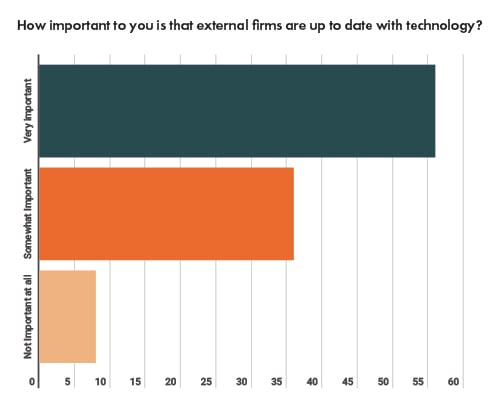Pressure to embrace change is also reflected in the relationships between in-house departments and external firms. As can be seen with the breakdown in the responses to this question, a majority (92%) believed either it was very important or somewhat important that external firms were up to date with technology. This result is not unexpected – what is unexpected, however, were the answers given by the 8% that did not believe this was important at all.
A common response within the 8% cohort was that external firms must provide sound advice first, and GCs seem not to be concerned with the methodologies by which the advice is delivered, regardless of tech or more traditional practices. Here we see some crossover in the attitudes of corporate towards in-house legal teams: to an outsider, legal teams remain a black box, even to other legal teams. What matters is only the result, and the belief that the result was arrived by a trustworthy method. So this thinking goes, why bother with any new tools that could increase efficiency for an external firm when the efficiencies are not obviously passed on to those requiring external support?
However, among those that responded that it was very important that external law firms are up-to-date with technology, some of the reasons include the need to provide faster and more efficient service to improve cost performance and more user-friendly documents. Here, a majority of GCs clearly understood the benefits that legal tech provided the profession, either due to personal experience or the desire to implement any tools that would help alleviate the strain on an already-overloaded in-house legal team. Additionally, one respondent made an insightful observation about developments in legal tech: ‘external firms should be the one driving innovation, since many in-house teams lack the budget to embrace more cost-intensive and newer type of legal tech.’
For that 36% that felt it was somewhat important that external firms be up-to-date with legal tech, some seemed a bit warier regarding the rapport between external law firms and legal tech. In fact, between those who selected ‘somewhat important’, even though law firms that implement technology into their process are highly competitive in the market, a few respondents expressed caution. One GC stressed the importance of a strong alignment between the technologies adopted by both the client and the external firm. When this alignment is absent, so they said, this introduced a new variable with potentially unexpected results, making it harder to understand the processes, and extending the length and complexity of the overall service.

